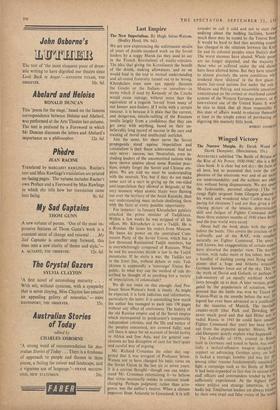Last Empire
The New Imperialism. By Hugh Seton-Watson. (Bodley Head, 10s. 6d.) The New Imperialism. By Hugh Seton-Watson. (Bodley Head, 10s. 6d.)
WE are now experiencing the unfortunate results of years of double-standard work on the Soviet leaders by a soggy Marsh (as they used to say in the French Revolution) of reality-rejecters. The idea that giving the Kremlinccrs the benefit of the doubt, making allowances, and so on would lead in the end to mutual understanding and all-round fraternity turned out to be wrong. Khrushchev even now can openly threaten the Greeks or the Italians—or ourselves—in terms which if used by Kennedy of the Czechs would cause outrage, without more than the equivalent of a roguish `tut-tut' from many of our keener nest-foulers. If I write with a certain rancour, it is because it is plain that the current, and dangerous, missile-rattling of the Russians results largely from a confidence that they can get away with anything, based on their un- believably long record of success in the care and training of moral and intellectual ostriches.
Just the same, for sheer nerve the Soviet propaganda stand against imperialism and colonialism is their finest achievement. And not only nerve: success, too. Neutralists, even in- cluding leaders of the uncommitted nations who have shown qualms about some Russian prac- tices, simply forget the Soviet and Chinese em- pires. We are told we must be understanding with the neutrals. Yes, but if they do not make some sort of a start in giving up the one-sided anti-imperialism they showed at Belgrade, at the very moment when atomic blasts were flaming out over the territory of the Asian Kazakhs, then our understanding must include deafening them with the facts at every possible opportunity.
For instance: in January Khrushchev publicly attacked the prime minister of Tadjikistan. Within a few weeks he was stripped of all his offices. Mr. Khrushchev is not a Tadjik. He is a Russian. He issues his orders from Moscow. He bases his power on the centralised Com- munist Party of the Soviet Union, which has a few thousand Russianised Tadjik members, but is overwhelmingly composed of Russians. What he and his associates decide is law in the Tadjik mountains. If he starts a war, the Tadjiks are in the front line, without debate or vote. Tad- jikistan is supposedly a 'sovereign' Union Re- public. In what way can the method of rule de- scribed be thought of as anything but a variety of imperialism, of colonialism?
We dO not insist on this enough. And Pro- fessor Seton-Watson's book is timely. As might be expected, it is both judicious and informative, particularly the latter. It is astonishing how much the author has managed to pack into 130 pages without any effect of costiveness. The history of the old Russian empire and of the Soviet empire which reconquered its predecessor's temporarily independent colonies, and the life and nature of the peoples concerned, are covered fully; and still there is space for an account of Soviet tactics in Africa and free Asia, and for general con- clusions no less disruptive of cant for their quiet and careful way of arguing.
Mr. Richard Crossman the other day sug- gested that it was arrogant of Professor Seton- Watson not to have changed his basic views on the Soviet Union in the last six or seven years. It is a curious thought—though one can under- stand Mr. Crossman entertaining it—to believe that virtue necessarily resides in constant mind- changing. Perhaps judgment, rather than arro- gance, was the author's motive. When a climate improves from Antarctic to Greenland, it is still
sounder to call it cold and not to start rb sodising about the bathing facilities, howe much these may be touted by the Tourist Bo It would be hard to find that anything essen has changed in the relations between the Kr lin and its colonial peoples since Stalin's de The worst excesses have abated. Whole peo arc no longer deported, and the majority those who so suffered under the old dicta have been allowed home. But they have retur to almost precisely the same conditions wh rendered them 'disloyal' in the first place. dozen fair-sized nations live under the rule Moscow and Peking, and meanwhile attention concentrated on the extinct or moribund colon systems of the Western European powers. or non-existent one of the United States. It wo,, be nice to think that all those responsible ftl this state of affairs would re-educate themsel at least to the simple extent of purchasing at digesting this masterly little book. ROBERT CONQUI,51










































 Previous page
Previous page